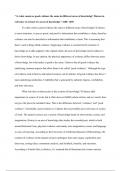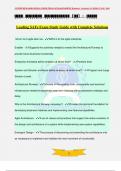Essay
“ Is what counts as good evidence the same in different areas of knowledge? Discuss in reference to at least two areas of knowledge.”- TOK essay
- Course
- Institution
“ Is what counts as good evidence the same in different areas of knowledge? Discuss in reference to at least two areas of knowledge.”- TOK essay with final grade of B
[Show more]




